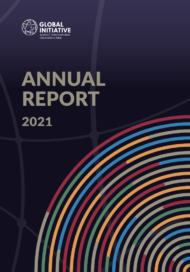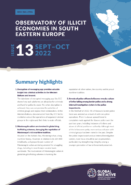Posted on 31 Dec 2021
One of the overarching targets of the GI-TOC’s 2021 to 2023 strategy is to become a global network in action, so that the organization is in a strong position to comprehensively monitor and firmly combat the phenomenon of organized crime – worldwide. In 2021, bold steps made towards achieving this target were evident in the organization and its outputs. We have staff members in 27 countries, and civil society observatories of illicit economies now covering six regions in all continents, with our latest, West Africa observatory getting underway in June 2021 and delivering its first outputs in the second half of the year. As this annual report shows, the organization is in a confident position to be both the globally authoritative voice on organized crime analysis and a global advocacy group to address the complex challenges posed by illicit transnational economies. And these challenges have in many cases been exacerbated over the last year and a half by the pandemic. The organization is not only expanding geographically, but also growing in numbers to meet the challenge, and to fulfil the strategy objectives. In 2020 and 2021, there was a steady increase in core staff, half of whom are now from developing countries, as well as consultants and associates. Meanwhile, the Global Initiative Network of Experts (henceforth, ‘the Network’), has increased to 555 members, and their recruitment is being positively targeted for gender, race and regional diversity. Financially, the organization is in a healthy position to support these growth initiatives, with annual revenue for the 2021 fiscal year forecast to be in excess of 13.5 million Swiss francs, and with a similar income projection for 2022. In addition to human resources, there has also been growth in the volume of, and thematic–geographic representation in, the publications and multimedia outputs this year. The current strategy phase provides for greater global representativeness in our research, and one key area with this in mind has been the establishment of a programme for professional translations of our published material in order to reach a broader target international readership. In 2021, the GI-TOC produced over 80 publications, including research reports, policy briefs, risk bulletins and online articles. Of these, over 50 have been translated (we currently make our material available in six languages). The research and analysis has covered illicit economies, black and grey markets, flows, trends and actors in nine geo-political regions, as well as flagship pan-international studies, such as the first ever global index of organized crime. The GI-TOC’s podcast series has also continued to grow, with 79 episodes released in 2021, and some episodes are also now produced in Spanish. Meanwhile, our informational videos and webinars continue to ramp up international engagement with our content. As well as providing the evidence base of organized crime through rigorous primary research, the GI-TOC, through its Resilience Fund, has expanded its programme during 2021 to support civil society initiatives whose work is to build mechanisms and processes that create resilience in communities all over the world living with organized crime. The Fund now supports 113 beneficiaries, out of which 26 are individuals, who engage in a range of initiatives in their communities dealing with impacts of organized crime by fostering resilience. The grass-roots-level work of the Resilience Fund has attracted new sources of funding during 2021. In 2021, the GI-TOC has sought to further leverage its well-established channels and platforms of engagement with the multilateral community. This crucial advocacy work has included partnering with UN programmes, co-hosting events during UN conferences, participating in intergovernmental meetings and presenting our research material in various settings. One key aspect of this sphere of our work has been to continue to use our influential voice to push for greater civil society access to UN processes. This and other threads of our work – be it producing the research evidence base or nurturing community resilience – all form part of one of the main founding principles of the GI-TOC: to put in place the foundations to support a global, holistic strategy to address transnational organized crime. This annual report looks at the structural, organizational elements that give the GI-TOC its ‘market advantage’ in this strategic drive. It then highlights the main outputs of its six regional civil society observatories over the past year, as well as other core initiatives and engagements, before reflecting on the importance of a global strategy against transnational organized crime – the most pernicious threat to human security and development in the world today.




